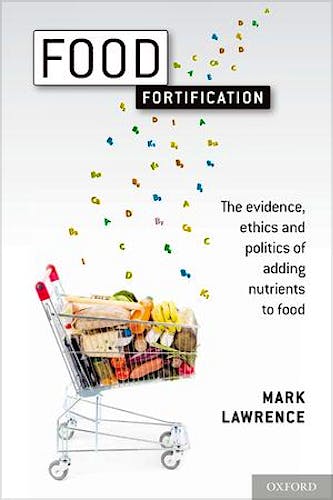

No hay productos en el carrito



Food Fortification. the Evidence, Ethics, and Politics of Adding Nutrients to Food
Lawrence, M.
1ª Edición Enero 2013
Inglés
Tapa blanda
280 pags
1000 gr
16 x 23 x null cm
ISBN 9780199691975
Editorial OXFORD
LIBRO IMPRESO
-5%
69,33 €65,86 €IVA incluido
66,66 €63,33 €IVA no incluido
Recíbelo en un plazo de
2 - 3 semanas
About this book
- llustrates competing scientific, ethical and political views that can arise in science policy-making
- An evidence-based review of the practice and policy-making theories behind the addition of nutrients to staple foods
- Increases understanding of how and why evidence of food and health relationships is being translated into policies that affect what people consume on a daily basis
Food Fortification: The evidence, ethics, and politics of adding nutrients to food critically analyses mandatory food fortification as a technology for protecting and promoting public health. Increasing numbers of foods fortified with novel amounts and combinations of nutrients are being introduced into the food supplies of countries around the world to raise populations' nutrient intakes. It is a technology that is becoming more widely used to tackle a variety of public health problems such as micronutrient malnutrition.
Food fortification policies and programs are controversial. There are disputes over the ethics of food fortification as everyone who consumes fortified foods will be exposed to raised levels of nutrients irrespective of whether they will gain any benefit and often without their knowledge. There are also contested views about the evidence that is available to support such activities.
This book discusses mandatory food fortification as an intervention to protect and promote public health through presenting a synthesis of the findings from research investigations into three topical case studies of mandatory food fortification: Universal salt iodisation to help prevent iodine deficiency disorders; mandatory flour fortification with folic acid to help prevent neural tube defects; and mandatory milk fortification with vitamin D to help prevent vitamin D deficiency. Each case study is assessed for its public health benefits, risks and ethical considerations.
Readership: Students enrolled in upper undergraduate and postgraduate courses in health sciences, health promotion, food and nutrition, dietetics, public health, public policy, as well as medical practitions, nutrition researchers, dieticians, and policy-makers.
Table of contents
1: Introduction
Section 1: The evidential, ethical, and political underpinnings of food fortification
2: Food fortification evidence and ethics
3: Food fortification politics: the actors, activities, and agendas
4: Investigating food fortification
Section 2: The case studies
5: Case study 1: Universal salt iodisation
6: Case study 2: Mandatory flour fortification with folic acid
7: Case study 3: Mandatory milk fortification with vitamin D
Section 3: Insights from the past and present, and a view to the future
8: Insights for food fortification and public health
9: A view to the future
10: Conclusion
© 2026 Axón Librería S.L.
2.149.0